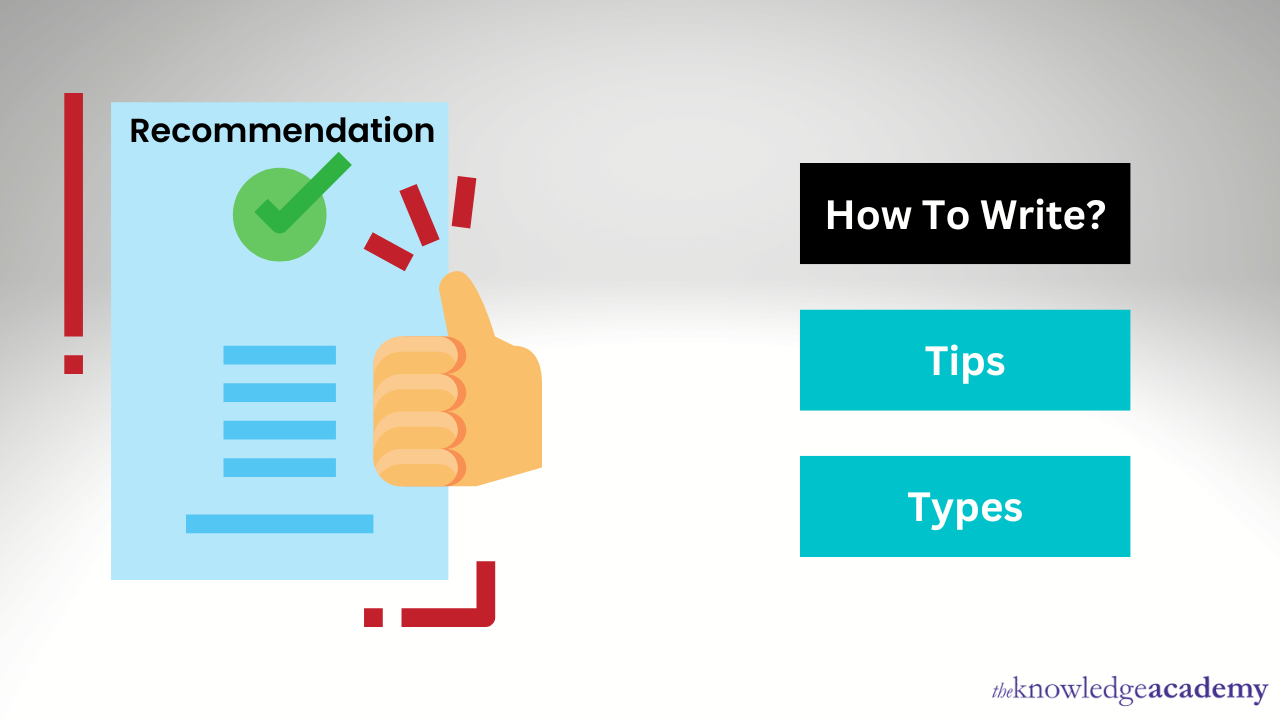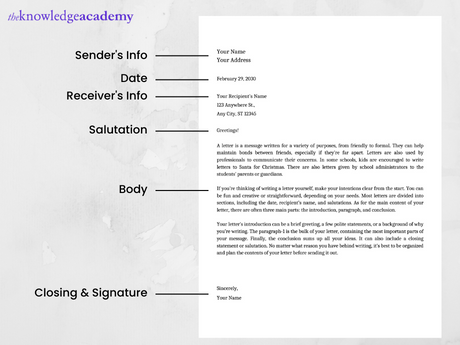We may not have the course you’re looking for. If you enquire or give us a call on 01344203999 and speak to our training experts, we may still be able to help with your training requirements.
Training Outcomes Within Your Budget!
We ensure quality, budget-alignment, and timely delivery by our expert instructors.

According to Statista, 20% of best jobs require Letters of Recommendation as a part of the application process. You can ask your Employer, Manager, or Supervisor to write your Letter of Recommendation (LOR).
Writing a recommendation letter for someone can feel like a big responsibility. If you are asked to write a letter to endorse someone's abilities, it is often helpful to research some key features and formatting requirements before you begin writing. In this article, you will learn how to write a Letter of Recommendation with tips, tricks, & examples for students, professionals, & others. Read more for the complete LOR guide.
Table of Contents
1) What is a Letter of Recommendation?
2) Types of recommendation letters
a) Academic Letter of Recommendation
b) Professional/Employment Letters of Recommendation
c) Character reference
4) How to write a Letter of Recommendation?
5) Tips for writing an effective Letter of Recommendation
6) Mistakes to avoid while writing a Letter of Recommendation
7) Conclusion
Want to build a career in HR? Select and join one of our extensive HR Training courses today!
What is a Letter of Recommendation?

A recommendation letter is a positive endorsement, showcasing an applicant's strengths and framing them as an ideal candidate for future employment or admission at an educational institution. In the letter, you can outline the characteristics, capabilities and qualities that make them the right person for a particular opportunity.
In a competitive environment, a good recommendation letter improves the candidate's chances of being considered for a position. A recommendation letter informs a Hiring Manager or admissions office of their strengths and weaknesses, which ultimately aids them in making a final decision in the selection process.
Types of recommendation letters
There are several common reasons why someone would request a Letter of Recommendation. Every Letter of Recommendation has the same goal: to promote the candidate as a perfect match for the position or programme they want to pursue. However, the appropriate topics to discuss in your letter range depending on the type.
Recommendation letters are usually of three types. Let's understand them one by one:
Academic Letter of Recommendation
Suppose you've been asked to write a Letter of Recommendation for a student. In that case, your letter should address both their academic success and the character attributes that make them a strong contender for the position in the programme or grant they're pursuing.
LOR offer admission committees information that may or may not be included in a college application, such as academic and career achievements, character references, and personal facts.
Scholarship and fellowship programs usually want recommendations as well. Students can obtain recommendations from past Professors, Administrators, Deans, Coaches, and other education professionals who are familiar with the student's academic or extracurricular achievements. Employers, Community Leaders, and Mentors are instances of other recommenders.
There are several application scenarios in which a student may request a Letter of Recommendation. They are:
1) Undergraduate college student
2) An internship or fellowship
3) A grant for a scholarship
4) Graduate, Medical, or Law school
5) Specific academic programs, such as the honours program
Professional/Employment Letters of Recommendation
Letter of Recommendation for employment are important tools for those looking for new jobs. Recommendations can be posted on a website, submitted with a CV, included with an application, utilised as a part of a portfolio, or distributed during job interviews. Most employers want at least three professional references from job candidates. As a result, job seekers should have at least three LOR in hand.
In general, employment recommendation letters include information regarding employment history, job performance, work ethic, and personal accomplishments. Former (or present) employers or direct supervisors usually write letters. Co-workers are okay but not as desired as employers or bosses.
Job seekers who do not have enough formal job experience to obtain recommendations from an Employer or Supervisor can seek references from a community or volunteer group. Academic mentors are an alternative option.
Character reference
Character recommendations or character references are frequently used for housing accommodations, legal issues, child adoption, and other similar situations where understanding a person's character is crucial. Almost everyone needs this form of recommendation letter at some point.
Former Employers, Landlords, Business Companions, Neighbours, Physicians, Friends, etc., frequently write these LOR. The most appropriate individual letter differs according to the purpose of the Letter of Recommendation.
Learn the fundamentals of HR Skills. Sign up for our HR Skills for Non-HR Managers course now!
How to write a Letter of Recommendation?

Your Letter of Recommendation shouldn't be more than a page long. Keep it to approximately the same length as a cover letter: a few tight, focused paragraphs that express your point without the fluff.
A Letter of Recommendation should be professional in tone. Write it in the same tone as you would use to write an email to a professional contract or a reference letter. It should not be written in the semi-tone as a piece of academic writing, but it should also not imply familiarity with the recipient or read like a casual letter. Using an incorrect tone in your LOR can reflect negatively on the individual you're suggesting, so be careful.
So here are some key factors to keep in mind while writing a Letter of Recommendation:
Greeting
In the first line of your recommendation letter, greet the recipient directly. Don't try to get extra creative; a simple "Dear Mr./Ms./Mrs./Dr. is the best choice. If you are unaware of the recipient's name, begin your letter with "To whom it may concern."
Introduction
In the following line, explicitly mention the candidate's name and the job for which you are suggesting them. In this part, you can also introduce yourself. Here are a few examples of good introduction lines:
Example 1: "I am writing to recommend [candidate's name] for acceptance into [university name]. I had the pleasure of teaching [candidate name] for the past three years at [school name/university name].
Example 2: “It is my pleasure to recommend [Candidate name] for the position [Designation]. [Candidate name] and I have worked together at [Company name] for the past so and so years.
Overview
This part explicitly highlights the qualities that make the candidate the best fit for the role. Depending on the recommendation, this could be a combination of personality qualities and talents or solely focused on the candidate's skills and accomplishments.
Personal anecdote
Elaborate on the attributes you discussed in your overview with personal experiences that emphasise the candidate's traits and talents. Be as precise as possible here—if there was a specific project where the applicant took the lead, or if there are statistics you can provide about their work, include them here.
Closing statement
Finish your letter with a remark that reiterates your recommendation. This statement can include a personal testimonial, such as the following example:
"After renting to [Candidate name] for the past years, I can confidently recommend her/him as a responsible tenant."
Signature
End your letter with a signature. Your recommendation letter signature should contain more information than just your name, similar to a formal email signature. Even if you likely mentioned it in your letter, include your title as a professional after your name.
Make it simple for the recipient of the letter to get in touch with you if they wish to talk about the candidate further by adding your contact information in your signature. The ideal options to provide are often a phone number, email address, and work hours.
Tips for writing an effective Letter of Recommendation
What you include in your recommendation letter is important. Remember that you are influencing a choice that might affect someone's future; therefore, how and what you include in your final product is important.
Start with good information
It's critical to have direction while writing a Letter of Recommendation. While many letters are fairly typical, prompts frequently request specific traits or examples regarding the candidate.
To write accurately, ask your candidate to provide the following:
1) Job description or program description in detail
2) Updated resume
3) Achievements, specific skills, qualification
4) Other documents like transcripts
Be personable
Your letter's addressee should get personal about the subject. To do this, you should include relevant information about your relationship with the subject and construct a picture of what the receiver could find useful.
Consider what the receiver would want to know about the individual in question while you write your letter and address it. Writing with a cheerful attitude is also recommended, regardless of the purpose of the letter.
Use facts
Anecdotal evidence is a terrific method to tell a story, but it can also be supplemented with concrete proof. Concrete evidence contains quantifiable instances of the subject's performance. This can be grades, achievements, performance history, or anything else for which you have data.
Highlight the positives
If someone asks you for a recommendation letter, you most likely have a great connection with them, which you should emphasise in your writing.
You don't have to go crazy to the point of gushing, but you should show real support for the candidate and avoid disparaging comments. Superlative remarks can be an effective technique to emphasise your favourable experience with the subject.
Stay formal
Letters of Recommendation must strike a delicate balance between expressing professional affection and asserting authority. Furthermore, when using anecdotal and quantitative data, keep it brief.
Your letter's recipient is most likely an Admissions Officer or Hiring Manager who reviews hundreds of documents like this one. Capture their attention, present your argument, and respect their time. Finally, to complete the formal look, select a professional font.
Professional font includes:
a) Times New Roman
b) Arial
c) Cambria
d) Georgia
Learn how to a become Certified HR Manager. Sign up for our Certified HR Manager course now!
Mistakes to avoid while writing a Letter of Recommendation
There are some do’s and don'ts while drafting a Letter of Recommendation. Now that you've seen what to do, let's look at what not to do while writing a Letter of Recommendation.
Don't generalise
Again, your letter should demonstrate rather than tell. To do this, avoid using generic language and making ambiguous generalisations about the subject. Broad descriptions are useless to the candidate. Stick to specific examples and information that help you construct a picture of who they are.
Avoid the basics
Avoid discussing the candidate's very minimal skills while describing them. Showing that the person can follow fundamental expectations does not distinguish them from the crowd.
Try not to be too one-sided
A Letter of Recommendation should depict the individual’s personal and professional characteristics. This implies you'll need to discuss your connection and their performance.
Refrain from being critical
As your letter highlights the applicant, it should not include any cheeky praises or subtle criticisms. You should avoid stating any negatives unless the guidelines clearly ask for them.
Don't forget to let them know who you are
At the start of your letter, describe yourself and your relationship with the candidate. This helps the receiver understand who you are and why you are eligible to send the letter. This introduction is critical for establishing the legitimacy of your communication.
Conclusion
In this blog, we have learned what a Letter of Recommendation is, the format of a recommendation letter and tips for writing an effective letter. Strong Letters of Recommendation can help you to get your dream job.
While it is ideal to have Letters of Recommendation written by your letter writers, you may be required to write your own sometimes. With this guidance, you will be able to properly write a Letter of Recommendation for yourself that will make you shine.







 Top Rated Course
Top Rated Course





 If you wish to make any changes to your course, please
If you wish to make any changes to your course, please


